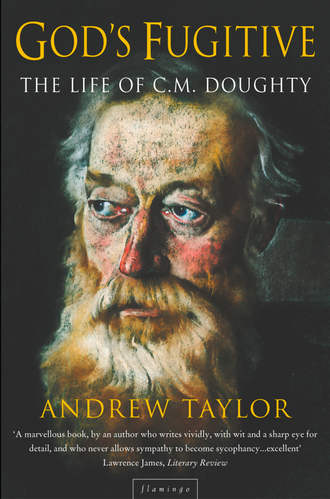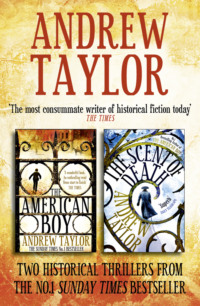
Полная версия
God’s Fugitive
The young Doughty simply had no time for literature, and certainly no time for the detailed study of language: those passions would come later. For now, with his characteristic singleminded determination, he wanted to concentrate only on his scientific studies.
He had no time, either, for the religious requirements of his college. Even at Caius, which was not among the most dogmatic or conservative of Cambridge institutions, there was a strict rule demanding daily appearances at religious services, and the college’s Chapel Attendance Book shows the young Doughty cautioned twice, and punished once, for his irregular appearances. Maybe unsurprisingly, for a young man who as a boy had been forced to sit through the Revd Bernays’s thunderous sermons, he was less than enthusiastic all his life about organized worship: after his death, his widow observed in a letter, ‘He never (or hardly ever) entered a church during service, but he loved to sit in any church or cathedral for hours. He was truly religious, in spite of never going to church in the orthodox way …’26
But Doughty’s studies in geology were already chipping away at the foundations of his own belief in much the same way as similar research had done for Lyell. His Christianity was too closely bound up with his sense of family, of tradition, and of Englishness for him ever to disavow it; but there can be little question that poring over the fossils gathered from the Suffolk chalkland must have sown the first seeds of religious doubt in his mind.
Failing to turn up for chapel was not a grave offence, and not likely to have incurred a serious penalty – probably a small fine or a period restricted to the college grounds – but, for a young man as careful of his dignity as Doughty, any punishment would have been a humiliating experience. It was almost certainly one reason for his decision to ‘migrate’ from Caius to Downing in 1863, two years after coming up to the university – years later, The Times said that the move came ‘after a difference with the head of his original college’27 – but there were others.
Cambridge University as a whole was gaining a growing reputation in botany and geology – although it would be several years before anything as dangerous or innovative as a scientific laboratory would be opened – and the relatively new Downing College, anxious to improve its academic standing in the university, was offering a number of Foundation Scholarships in Natural Sciences. Doughty’s friend Bradbury had already been accepted for one of these, and although Doughty did not need the £50 a year the scholarship offered, he would have relished the academic standing it would confer.
He was disappointed, because he entered Downing without a scholarship. But simply making the transition from the quiet, enclosed courts of Caius to the wide open spaces of Downing was significant: apart from the lack of enthusiasm at Caius for the newfangled study of science, there was the rigid insistence on the need to attend not only chapel, but also lectures. Doughty wanted to study on his own, and the more easygoing atmosphere at Downing attracted him. His own explanation was straightforward: ‘They bothered me so much at Caius with lectures and chapels and things, and I knew that at Downing I could do just as I liked …’28 Certainly, Bradbury boasted later that he never attended a single lecture as an undergraduate at Downing – and, as an additional incentive, the college buildings did not yet boast a chapel.
There was no lasting rift with his former college – on the contrary, Doughty remained on cordial terms with Caius, took his Master of Arts there, presented the college with gifts and paintings, and even used it as a forwarding address later in his life. But for someone who felt less than enthusiastic about the entire ambience of the university, Downing was a more congenial place to live than the more staid and ancient Caius. It was a new college, a college for the modern age, and one which seemed to delight in being almost semi-detached from the university as a whole. Doughty walked away from the college where his father and his grandfather had studied without a backward glance. The young man who was to prove himself in so many ways obsessed by tradition and antiquity was showing in his choice of college, as he had in his choice of subject, that he had a strong and determined mind of his own.
There is no doubting the seriousness with which he approached his chosen field of study at Downing – but it was to be several months before he could resume his formal studies.
Throughout his life Doughty complained of weak health – and throughout his life, when it let him down, he would set off at a tangent to ‘convalesce’ in some extravagantly physical and energetic enterprise which would have taxed an athlete in the peak of condition. So it was as he started his first term at Downing: he was granted leave to postpone his final exams, and announced his intention of spending some eight or nine months surveying the fiords and glaciers of Norway.
The declared aim of his journey was the observation of the ice-flows of the Jostedal-Brae glacier field, and he fulfilled it completely enough to produce his second paper for the British Association when he returned. But those studies took only a couple of months, and much of the rest of his time was spent wandering more or less at random, in much the same way as he did later through Europe and Arabia. Before he travelled north-west to the Jostedal-Brae, he had spent some time at the university in Christiana, as Oslo was then called. The earnest young Englishman, diligently jotting down words and phrases of Danish as he struggled to build up a working vocabulary, must have been an unusual sight in the small university, which had only been founded fifty years before. Norway was a poor country: it was more customary for their students to travel abroad than for foreigners to come there.
Doughty’s priorities remained scientific, but his interests extended far beyond the university. This was not the quiet, studious life he had enjoyed at Cambridge: instead, he set off into the hills, lodging with farmers and gamekeepers, sometimes sleeping rough in log huts, and trekking for days at a time on shooting expeditions that took him and his guides miles into the remote mountain slopes.
It was a time that he remembered in Arabia years later when, near the end of his travels, he struggled from the interior towards Mecca ‘in a stony valley-bed betwixt black plutonic mountains, and half a mile wide: it is a vast seyl-bottom of grit and rolling stones, with a few acacia trees. This landscape brought the Scandinavian fjelde, earlier well-known to me, to my remembrance.’29
That description gives some idea of the Norwegian countryside to which he had travelled, supposedly for the sake of his frail health, and when, in mid 1864, he arrived at the sixty-mile-long ridge of the Jostedal-Brae, it was to find an environment and a lifestyle that were certainly no easier. ‘Here is an arctic climate, and we found the lakes covered with ice in the middle of August, still thick enough to bear some wild reindeer, which we disturbed. We slept under a stone, while it froze outside, according to a minimum thermometer.’30
Five separate glaciers descended from the ridge into a gorge below, which was so deep and sheer that the sun hardly reached it during the winter months. It was remote, unfriendly country, with just a few scattered farms and a rough bridle path between the rounded boulders which the glaciers had brought inching down with them from the mountains.
But it was a magical land as well, and it was not just Doughty the geologist scrambling with his guide over the rocks, ice and broken ground. As he wrote his report later, his descriptive enthusiasm struggled against a determined scientific detachment. The Nigaard glacier, he wrote,
seems to flow down in elegant curves; though in reality this is due to the tossing up of the surface by some submerged knees of the mountains, and it passes through nearly a straight channel. No stones or earth soil its glittering surface, which appears capping the cliffs and creeping down every depression and pouring out its water in picturesque threads down the rocks.31
At the foot of Lodal’s glacier, meanwhile, water came gushing out from an arched cavern in the ice some thirty feet high. The name of the lake, Styggevaten, meant ‘horrid-water’, he jotted carefully in his notebook – names and their meanings would carry a fascination for him throughout his travels, landscape and language inextricably linked in his mind. Between the detached response and the imaginative, he saw little distinction: at times, the Jostedal-Brae sounds almost like the setting for a mystical scene from Ibsen: ‘Loud peals are heard booming among the heights when some new ice-shoot takes place and seems to smoke in the distance,’ he wrote.
It was also a landscape that encouraged thoughts about the continuity between the present and the far past – the ice offering the imaginative possibility of a direct link with the most distant history. That was the sort of speculation that appealed instinctively to Doughty, and he noted that the glaciers were continually engulfing plants and animals, preserving them virtually for eternity. Humans, too, he said, must occasionally be entombed. ‘Very early traces of the human race may some day be dug out from the deposits of the later glacial period, if man was then in existence and inhabited those parts of the globe …’
But his primary task was the more prosaic one of measuring the speed of the glaciers’ movement. He had been loaned a theodolite by the Royal Geographical Association to help him with the detailed surveying – his first contact with that august body, later relations with which were to prove volatile. For the rest, he had a rope, an iron-tipped stick, a set of metal spikes to help him stand on the ice, and the aid of a local guide, one Rasmus Rasmussen.
With this rudimentary equipment, by driving stakes into the ice of the glacier as markers, and building matching stone cairns off to one side, he produced a series of tables for the different glaciers to show the varying speed of the flow. They were, he noted with pardonable pride, the first measurements ever obtained of the seasonal motions of Scandinavian ice streams.
It was a subject of some current scientific interest. Geologists were arguing about exactly what caused glaciers to flow, and Lyell himself was enquiring into the subject for the new edition of his Principles. But though there can be no doubting the enthusiasm and determination of the twenty-one-year-old Doughty, his figures leave something to be desired. The distances between his markers, he admits, were little more than estimates; on one glacier, presumably having forgotten to use his theodolite, he has guessed the gradient; and one complete set of figures, setting out the lengths of the different glaciers, he has simply lost, replacing them with estimates.
Later, he was to claim that, in preparing the last edition of his Principles of Geology, Lyell called on the young undergraduate to ask for details of his observations.32 It is certainly likely that Doughty made the great man’s acquaintance: the first thing he did when he returned from Norway was prepare a paper for the annual meeting of the British Association for the Advancement of Science on his observations. Lyell, then president of the association, was speaking about glaciation in his inaugural address: what more natural than that he should exchange a few words with the shy, gangling youth who had just returned from Norway? That, though, is as far as it went: the Principles includes little about Norwegian glaciers, nothing at all about the Jostedal-Brae, and certainly no acknowledgement of assistance from Charles M. Doughty and his lackadaisical measurements.
But the expedition had given him at least the beginnings of a scientific career. He had become a life member of the British Association earlier that year; now, the misspelled name of C. Montague Doughty was printed in the list of members – albeit with his address, too, wrongly listed as Dallus College, Cambridge. While the paper he had produced after his diggings at Hoxne had been only briefly noted by its title in the annual report, the account of this latest one, which was presented to the association’s Bath meeting, ran to 350 words. He had also, though still an undergraduate, been making the social contacts necessary for a career in science. He had cultivated not just the acquaintance of Sir Charles Lyell himself, but also that of several other worthies of the British Association and the Royal Geographical Society. And, most important of all, if he had been disappointed not to be given a scholarship by Downing, he was still confidently expected to gain a first-class degree.
But in December 1865 those expectations were dashed. Doughty found himself near the top of the second class in the Cambridge Tripos examinations – although it seems that his examiners were at least as disappointed as he was with the result. More than fifty years later Professor Thomas George Bonney, then Professor of Geology at London University, said of his distinguished pupil: ‘I was very sorry not to be able to give him a First, as he had such a dishevelled mind. If you asked him for a collar, he upset his whole wardrobe at your feet.’33 It would not be the last time in his life that Doughty would be criticized for hurling facts at his readers by the handful.
But while such an examination result would have been a setback, it would not necessarily have prevented him from following a career as a scientist, particularly as he still enjoyed the financial support of his father’s legacy. Doughty, though, seems to have changed his priorities during that final year at Cambridge: although he prepared his report on Jostedal-Brae for its full publication, he had abandoned any thought of making his name through science.
A letter written to him shortly before his final examinations by the Revd Henry Hardinge, the rector of Theberton, seems to confirm that he still had grandiose plans – the adolescent boy who had been turned down by the navy clearly still thought in the same patriotic terms of serving his country. Hardinge refers to Doughty’s ‘researches and noble ambition as regards this earth’, and goes on to praise his determination to ‘soar above the vanities of this world and take a place among the worthies who have lived for its adornment and the real glory of God’.34 But the researches and noble ambition would be directed at literature: though science and geology would remain among his interests, his life, he had decided, would be devoted to writing. He left the university with his second-class degree, no firm plans for a career, and a brief formal note of introduction from Bonney.
Doughty, after all, could afford high-flown ambition: there was no pressing need to find a way of earning his living. His education had not been designed to fit him for a career, unless perhaps, like his father, as a parson in one of the Suffolk livings. His inheritance should have enabled him to live a life of comfortable scholarship. For fifteen years his financial affairs had been cautiously managed, with his father’s old friend, Henry Southwell of Saxmundham, and his own uncle and guardian, Frederick Goodwin Doughty, acting as trustees. Now, with his studies behind him, he could take up the rights that had passed to him on his twenty-first birthday. He had both the power and the leisure to handle his wealth himself.
What he does not seem to have had was luck or shrewdness: over the next three or four years his inheritance simply withered away. He was never to show the remotest financial acumen, and it is significant that the collapse of his financial affairs should have come just after he took over the active management of his investments from his father’s trustees.
Neither Doughty nor anyone else in his family would ever say exactly what happened. Fifty years later the memory of the collapse clearly still hurt: asked about stories of his past involvement in the printing industry, he replied shortly, ‘Printing I conceived of in my early inexperience as an adjunct to literature, but I was deceived in that matter, and was somewhat of a victim. Therefore it would not be kind to mention it.’35
His widow would only speak generally of ‘depreciation of investments’ – but the overall effect was that the rest of Doughty’s life was passed in a state of genteel poverty. Years after his death she turned down the offer of financial help for herself and her daughters from her husband’s friends: ‘Really we are much better off than a good many people … I think Rubber will recover in time; I have put up half the grounds for sale; if a small bungalow is built it won’t hurt us, but so far, I’ve had no success there. I sold 5 dozen spoons and forks for £17 …’36 Her husband’s books, respected as they were, made little money: financially, he simply never recovered from the crushing blow of his early twenties.
Doughty’s response at the time was to bury himself in his books. The letter of recommendation he had taken with him from Cambridge had been addressed to the Library of Winchester College, probably because of some personal connection of Bonney’s; but he used it, and his standing as a graduate, to gain entrance to the Bodleian Library in Oxford.
His name first appears in the Bodleian’s records on 1 December 1868; and for the next fourteen months he was an assiduous reader there. He was, he said later, a solitary man, and entirely dependent now on his own resources to direct his studies – but a glance down the list of books he was reading at the time demonstrates that he had already established where his primary interests lay. There is nothing of modern science – and precious little as late as the seventeenth century.
There is Gavin Douglas’s translation of The Aeneid, published in 1553; several books of medieval songs and ballads; a number of Anglo-Saxon grammars and dictionaries; commentaries on the Bible, catechisms and sermons. Doughty was immersing himself in the distant past. Above all, he was reading Spenser and Chaucer, the two poets he believed all his life had reached the uncontested summit of English literature. It was they, he told an interviewer not long before he died,37 who finally decided him upon a life dedicated to poetry.
When, at the end of his life, he completed Mansoul, which he firmly believed to be his greatest work, he declared: ‘I have not borrowed from any former writer; save I hope something of the breath of my beloved, Master Edmund Spenser, with a reverend glance backward to good old Dan Chaucer …’38 It was at the Bodleian, as he threw himself wholeheartedly into the new life of a poor scholar, that he first made their acquaintance.
But there is one book among the volumes of ancient history and literature which seems slightly out of place. Of the works of the seventeenth-century writer George Sandys Doughty chose neither his translations of Ovid, nor his poems based on the Psalms and the Passion, but his travel writing, A Relation of His Journey to the Levant.39
Possibly he was struck by the similarities between his own position and that of his Jacobean predecessor, who came, like him, from a background of well-connected country gentlefolk with naval antecedents. Sandys, too, had been a literary man and an academic – and in 1610, at the age of thirty-two, he had set off on a journey that took him through Europe and into the Middle East.
The two years of wanderings described in Sandys’s book took him through France, Italy, Egypt, the Middle East and Malta. He gazed with a slightly bilious eye on the ancient wonders of the pyramids and of the city of Troy; he was robbed and manhandled by angry Muslims in the towns of Palestine and as he journeyed by caravan across the desert; he was fascinated by the habits and beliefs of the common people who were his companions.
There were moral and religious lessons to be drawn from his travels. The naturally rich lands of the Middle East, he wrote, were now waste, overgrown with bushes, and full of wild beasts, thieves and murderers. It was a country in which Christianity – ‘true religion’ – was discountenanced and oppressed: ‘Which calamities of theirs, so greatly deserved, are to the rest of the world as threatening instructions … thence to draw a right image of the frailty of man, and the mutability of whatever is worldly.’ The thought, and its expression, could almost have come from the pages of Travels in Arabia Deserta two and a half centuries later.
Doughty still hoped to achieve some great literary success, but in the meantime, he could no longer afford the leisured scholastic career he had anticipated: he would have to find some way of supporting himself on his greatly reduced means. Travel, and the life of a wandering scholar, might offer one solution.
Chapter Two
The next year, out of a reverence for the memory of Erasmus, Jos. Scaliger, etc., I passed in Holland learning Hollandish … I spent some months also at Louvain and the winter at Mentone (I had always rather poor health). I travelled then in Italy and passed the next winter in Spain, and most of the next year at Athens; and that winter went forward to the Bible lands …
Letter to D. G. Hogarth, August 1913
The Charles Doughty who left England for the continent in 1870 was a man who had been emotionally battered almost to submission – shy, retiring, and without a shred of emotional self-confidence. At twenty-seven, he was a Master of Arts, a scholar widely read in medieval literature and with some knowledge of geology and science, a man filled with literary and academic ambition, but without any obvious means of earning a living. His studies provided one safe retreat from the daunting world of human relationships; the lonely life of a solitary wanderer would be another.
There was no need to reach back to the sixteenth century for explanations for his decision to travel. The idea of paying homage to Scaliger1 and Erasmus,2 the one looking back from his own time to ancient history, the other rejecting the calling of a churchman and then leaving Cambridge to wander Europe as a peripatetic scholar, was appealing to his intellectual self-esteem, but it did little to explain his real motives.
One manifestation of his chronic lack of confidence was his constant wittering concern about his health. It had already led him to abandon his studies at Cambridge for a year, and he would claim later in his life3 that his hard work in the Bodleian had left him weak, ill, and in need of a change of climate. It was a common predilection: the hotels and sanatoria of Menton and the other Mediterranean resorts were full of sickly Englishmen taking the air, although few of them would have undertaken travels as extensive or as energetic as Doughty himself was embarking upon.
Like some of them, he had a pressing financial motive for leaving Britain. He had neither possessions nor prospects to keep him in England, and contemporary guidebooks estimated that something under ten shillings a day4 should be sufficient for walking tours in remote areas of Europe. Life could be lived much more cheaply travelling the streets of the continent than at home; the future would have to look after itself.
So to save his money and to preserve his health, he decided to go abroad. But the letter to Hogarth more than forty years later puts his supposed weak constitution into context: the hardships and discomforts he was to endure over the next eight years would have killed a less hardy individual. He was a man dedicated to living his life through his books and scholarship – and yet, at this time of personal crisis, Doughty the diffident intellectual was determinedly pitting himself against a series of physical challenges. It would not be the last time.
It was not exactly a Grand Tour that he undertook: Europe was in ferment, with either open fighting or sullen, smouldering peace in France, North Africa, Spain and the Balkans. Doughty faced the prospect not just with courage but with all the insouciance of an English gentleman as he picked his way from troublespot to troublespot, peering superciliously past the shattered landscapes and the weary people to jot down his reflections about the ancient ruins he had come to see.







